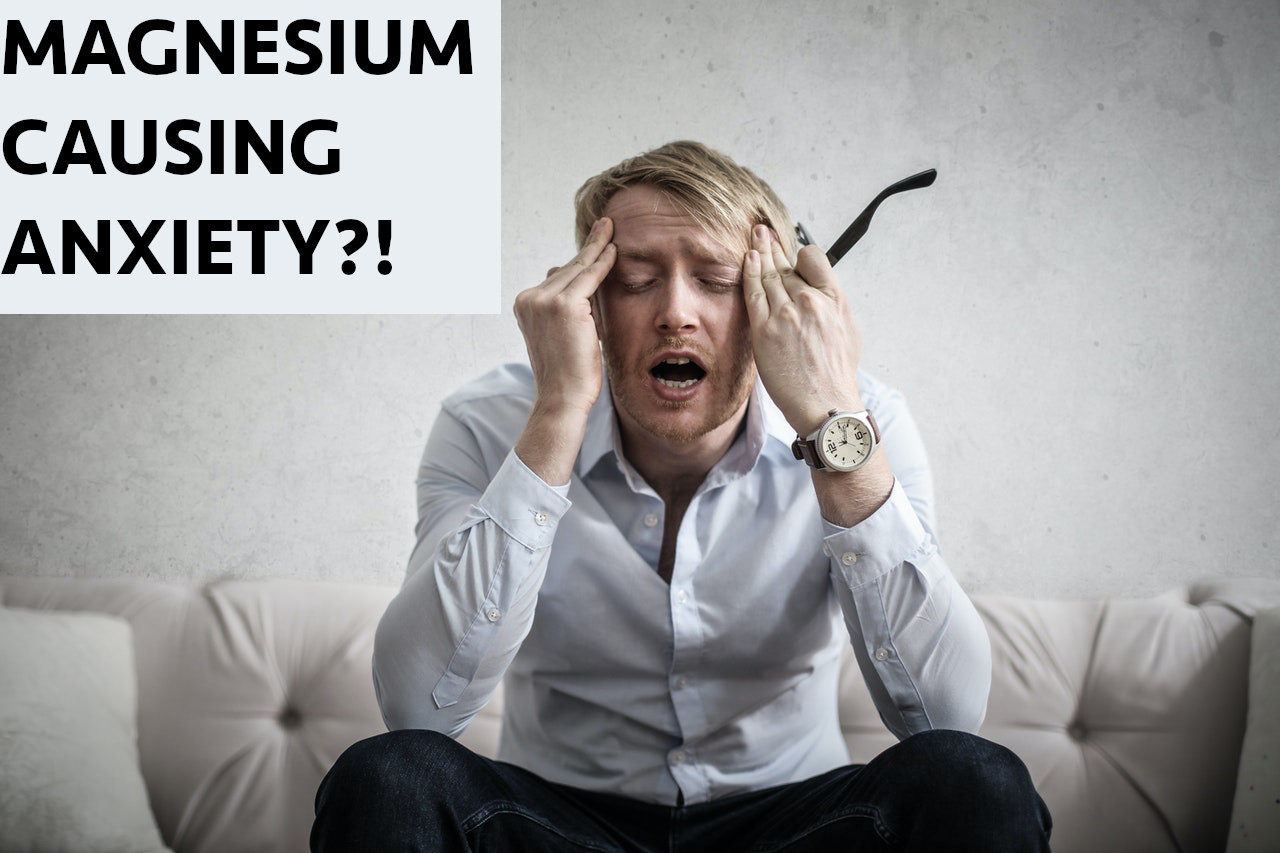If you’ve ever taken a magnesium supplement it was likely to overcome symptoms such as anxiety, heart palpitations, constipation, or insomnia. This powerful supplement works successfully for countless people. However if you’re unfortunate enough to have taken magnesium and had the complete opposite side effects you may be one of the unfortuante few, but can magnesium actually make you anxious? If this happens are you unable to reap all those great rewards from magnesium, or is there a way to overcome this supplement set-back?
Magnesium can make you feel anxious when your electrolytes aren’t already in balance, or you suffer from a co-factor condition. Depending on the why it’s caused this anxiety there may be a simple way to resolve it.
If you feel like magnesium is actually causing anxiety, it doesn’t have to be the end of the world (and you certainly aren’t alone.) So let’s talk about the various situations this could happen and what you should do about it.
Can magnesium cause anxiety
Let’s say you’ve read all about the benefits of magnesium supplementation, you may even be using it to naturally reduce stress or depression. Only now you’ve begun taking it either right away, or after a period of time, you begin to notice some strange symptoms. Rather than alleviating these issues you suspect magnesium is making you feel worse. In this case you may be wondering, could magnesium be causing anxiety?
In fact your suspicions may be correct. Whilst magnesium is heralded as a cure all which for most people it often can be, some people aren’t so lucky. Due to a number of chemical variations in each of our bodies we all react differently to supplements. For some people magnesium can be the cause of your anxiety.
Magnesium makes me anxious
After ruling out your other supplements and of course eliminating the possibility that you are in fact in an anxious situation- your magnesium supplement may be the only other answer, which leads you to the conclusion a few of us have faced, magnesium is giving me anxiety. So what gives?
The answer lies in mineral balancing. If you’re not already familiar with mineral balancing check out the About Us to understand what mineral balancing is and how it effects the supplements you take.
What we must remember is when we take any supplement, but more specifically a mineral, it will interact in our body with other minerals or supplements. For example, magnesium is utilised for the absorption of vitamin D. Which means if we are low on magnesium already and supplement vitamin D we may worsen our magnesium defiency, this is a fairly commonly problem with vitamin D supplementation.
Magnesium can make you anxious, but maybe not in the way you think. Magnesium itself is not directly giving anybody anxiety. What’s happening is magnesium supplementation is reducing the absorption of other minerals, usually electrolytes. When magnesium levels get too high we run the risk of it ‘diluting’ potassium, sodium and calcium.
Whilst magnesium is required for the absorbtion and balance of all three of these electrolytes, in too high a dose it will cause the body not retain these essential minerals. If we have too low electrolytes it can cause the following symptoms;
- Headaches
- Hyper Irritability
- Irregular Heart beat
- Lethargy
- Insomnia
- Nausea
- Brain Fog
- Loss of appetite OR sugar/salt craving
Do any of these symptoms sound familiar? If you’re suddenly realising that the symptoms of anxiety and the symptoms of electrolyte deficiency are very similar, then you wouldn’t be the first person. If you’re wondering why magnesium may be giving you anxiety this could be the cause.
How to fix magnesium causing anxiety
We’ve established magnesium can offset other minerals such as vital electrolytes, and that a deficiency in these electrolytes can lead to anxiety, but what can we do about it?
Firstly, do pay attention to the recommended daily allowance of magnesium. This would be between 310-420mg per day for most adults. Whilst we’re all different and some people may need much more, or much less, generally this is a good guideline. When people spout that they’re taking 1000mg of magnesium per day or more I can’t help but cringe. It may not cause issues after one day, or maybe not after one month, but super dosing minerals such as magnesium for long durations will eventually cause issues.
The way we address this paradoxical issue with magnesium is to ensure we consume all electrolytes in healthy doses. If you have high doses of magnesium then you will need at least some sodium, calcium and potassium to stay in balance. Achieving this through the intake of whole-foods is normally your best bet because nature often contains the right ratios of nutrients. If we start supplementing to achieve balance it can be very tricky to achieve. If you find supplementing with whole foods consider an electrolyte drink, or a trace minerals supplement.
TIP: More often than not, when treating people with this exact issue I have found low sodium to be the offending electrolyte. Magnesium reduces sodium absorption in the gut so when we supplement magnesium our sodium levels decrease. If you follow a low salt/high water content diet this issue is worsened moreso. Consider a salty snack when dealing with anxiety to boost your adrenal reserves and balance your magnesium supplementation.


